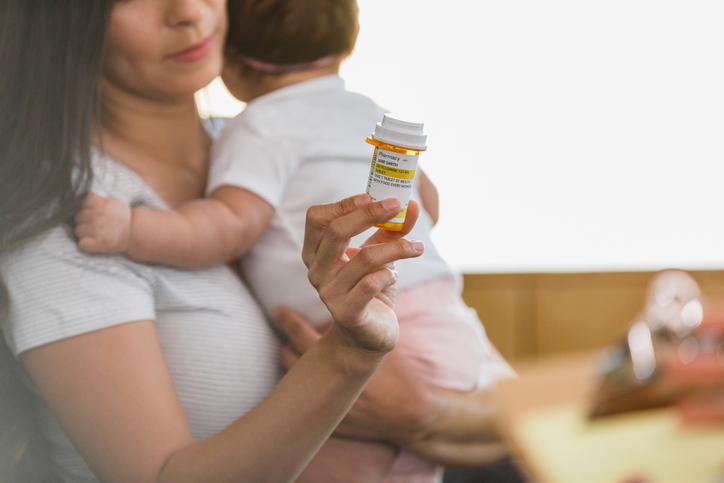What You Need to Know About the Postpartum Depression Pill

By Joy Stephenson-Laws, JD, Founder
The following story is so unbelievably tragic, but I think it needs to be discussed because it forces us to acknowledge a major health issue in this country: postpartum depression.
Dr. Krystal Cascetta seemed to have it all. A successful career as a practicing oncologist at Mount Sinai Hospital, good looks, a chef and entrepreneur husband, a one million dollar home in Westchester, New York and a beautiful newborn baby girl.
Recently, on a Saturday morning, Cascetta shot her baby and then herself in her home killing them both.
“Postpartum mental health conditions impact an estimated 20% of new moms, and investigators believe postpartum depression, or more severe postpartum psychosis, was a factor in the death-by-suicide of cancer doctor Krystal Cascetta after police said she shot and killed her 4-month-old baby girl at their home in Somers, Westchester County,” according to a report from CBS News.
You may have also heard about the heartbreaking story of Lindsay Clancy, a 32-year-old mom of three and labor and delivery nurse who strangled all of her kids to death with exercise bands and then jumped out of a window of her home. She survived the jump, but is now reportedly paralyzed. According to several reports, before the murders of her children Clancy was taking up to 13 prescription drugs for her mental health issues, including Ambien, Valium and Prozac.
We have to protect our mothers. Postpartum depression affects one in seven mothers. In addition to this, some reports say that more than 30 percent of new mothers with postpartum depression and anxiety already have a mental health issue such as depression before even getting pregnant.
Postpartum depression is often treated with serotonin reuptake inhibitors (SSRIs).
“Until a few years ago, clinicians treated postpartum depression with a combination of psychotherapy and selective serotonin reuptake inhibitors (SSRIs), a type of antidepressant that includes Prozac and Lexapro. But SSRIs are sluggish—it can take up to three months for people to respond to these drugs, and they may need to be taken indefinitely,” according to this report from Scientific American.
“Then, in 2019, the FDA approved brexanolone as the first drug specifically for the treatment of postpartum depression.”
Honestly, brexanolone is not the most feasible or accessible option. Apparently, it costs a whopping $34,000 per dose and it requires that the patient receive the medication via intravenous therapy for 60 continuous hours!
Now, there has been a major breakthrough in the treatment of postpartum depression. The Food and Drug Administration (FDA) just approved the first ever oral medication specifically for treating postpartum depression. The medication is called Zurzuvae (zuranolone). It seems what makes this drug particularly appealing is that it only needs to be taken once a day for two weeks. So it may work much faster than SSRIs. Because it is not advised to drive or operate heavy machinery 12 hours after taking Zurzuvae, it is recommended that the pill be taken in the evening with a fatty meal. The recommended dose is 50 mg per day.

The price is still unknown and it may not treat major depressive disorder. As mentioned, many women already have depression before they even get pregnant.
Furthermore, “Sage Therapeutics designed zuranolone to be an “episodic” treatment akin to an antibiotic regimen—that means people take the drug for two weeks and then stop. But it’s unclear how long zuranolone’s benefits continue beyond the 45-day period investigated in its clinical trials. If people’s symptoms recur, follow-up studies will be necessary to establish whether people can safely and effectively be treated with a second course of zuranolone, Deligiannidis [a behavioral scientist that was referenced] says,” according to the report from Scientific American.
I think it is great that this medication may be a viable option for the many women experiencing postpartum depression and anxiety, however, I think we also have to understand that postpartum depression and mental health issues in general usually need to be treated with multiple strategies including exercise, talk therapy and good nutrition (in addition to possibly taking medication).
Never forget the role nutrition plays in postpartum depression.Nutrition is especially invaluable. I highly recommend checking out this pH blog, which goes into great detail about the role of nutrition in postpartum depression. I also recommend these blogs on nutrition and pregnancy.
Finally, if you know a new mother or mom-to-be, be aware of the hurdles she may be facing. Make a special effort to check in on her. Invite her to go for a walk, or see if there is anything you can take off of her plate.
Enjoy your healthy life!
Disclaimer: This article is not intended to provide medical advice. Please consult with your doctor or another competent healthcare practitioner to get specific medical advice for your situation.
The pH professional health care team includes recognized experts from a variety of health care and related disciplines, including physicians, attorneys, nutritionists, nurses, and certified fitness instructors. This team also includes the members of the pH Medical Advisory Board, which constantly monitors all pH programs, products, and services. To learn more about the pH Medical Advisory Board, click here.







